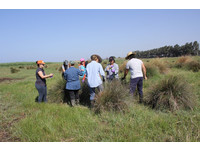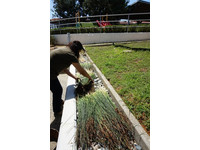Birds of Akrotiri Marsh
Cyprus lies on one of the main migration paths (or flyways) used by birds as they fly from Africa to Europe to breed in the Spring, and back again in the Autumn. Over 200 migratory bird species are regularly recorded in Cyprus, representing over 80% of the Islands bird fauna. Cyprus as a whole – and Cyprus wetlands in particular - also represents a significant winter refuge for birds escaping the cold of mainland Europe. Over 120 bird species regularly winter on our island.
Cyprus hosts relatively small numbers of breeding birds, but there are some very significant species among these, including two endemic species (Cyprus Warbler and Cyprus Wheatear), four endemic sub-species (Coal Tit, Short-toed Treecreeper, Cyprus Jay and Scops Owl) and important numbers of rare breeders for Europe, such as the Roller and Masked Shrike, which are species of conservation priority.
Akrotiri marsh is an important migration stop-over, a good wintering site and also a key breeding site for bird species of conservation importance. The Important Bird Area (IBA) which includes the Akrotiri marsh, Peninsula and the Episkopi Cliffs is among the outstanding IBAs of Cyprus, and the marsh is a key part of the complex of habitats that make up the IBA. This extensive IBA site is a congregation site for waterbirds in winter and spring, including globally important number of Flamingos, and a raptor bottleneck site in the autumn, with globally important congregations of four birds of prey including Red-footed Falcon. Other notable migrants occurring in numbers of regional importance include Little Egret, Glossy Ibis, Crane, Demoiselle Crane and Collared Practincole.
Important breeding birds at Akrotiri marsh are Ferruginous Duck, Spur-Winged Lapwing, Black-Winged Stilt, Black Francolin and probable Little Bittern. Also of note are the Reed Warbler and Black-headed Yellow Wagtail which breed only at a few sites in Cyprus. The site is amongst the best breeding sites in Cyprus for the Ferruginous Duck, a species of global conservation concern.




